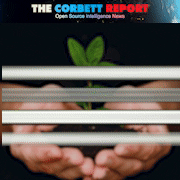Podcast: Play in new window | Download | Embed
Dr. Tjeerd Andringa of GeopoliticsAndCognition.com joins us to discuss a question James posed in the last subscriber video: are conspiracy theories falsifiable? We discuss Karl Popper’s famous “falsification” criteria for the demarcation of science and its potential applicability to geopolitical events. Dr. Andringa also details an approach for how to proceed in developing resilient hypotheses in an unstable, chaotic and non-closed system like global geopolitics.
SHOW NOTES:
GeopoliticsAndCognition.com
Interview 776 – Tjeerd Andringa on Geopolitics and Cognition








To continue with the analogy, could we say geo-engineering is the “invisible hand” that shapes certain weather patterns; the “invisible hand” being an outside variable that determines the future of certain events and patterns in the political sphere? This would make it more difficult to solidify an understanding of the behavior of a region’s climate – and wouldn’t it be a fallacy to say that because an area’s climate has ‘always’ been a certain way, that doesn’t make it necessarily true into the future; because the United States is the overarching global power at this time, doesn’t mean it always will be.
(I’d like to clarify, that I’m not saying the US and the ‘invisible hand’ are congruent to one another, because I believe the ‘invisible hand’ is the chess master who plays the piece we call the United States and other global forces to achieve certain ideals.)
Like Dr. Tjeerd Andringa was saying, it’s very difficult to form our conclusions because we’re not in a closed environment and we’re always subject to multiple variables all the time; though, like an alchemical process, we can boil down our subject as close to its essence as we can.
My convictions about 9/11 begin with my education in physics and chemistry. I’m not a physicist, but I’m educated in science. I have followed the arguments, demonstrations and experiments of David Chandler, Steven Jones, Niels Harrit and David Ray Griffin, and to my mind, these scientific arguments do indeed disprove (falsify) the entire government story about what happened on 9/11.
Tjeerd touched on a useful interpretation of the weather analogy. We are only capable of observing the weather and forming a climate model. We are not capable of predicting the weather. To put it in terms of your investigations; I think this predictive shortfall is in part because the “powers that shouldn’t be” have the wild card of making anything happen any time and any place. This, however, does not mean the controlling powers do not have a plan in motion. This plan is the climate. We may not be able to say an assassination of a particular middle east political leader will happen in such a way on such a day. But we can say that if there is a leader that is bringing peace and unifying the muslim countries of the region, they will be removed. Peace in the middle east does not fit the climate model. Where we see events that clearly fit the climate model, we can look into the details to find more links and improve our model. This may help focus our efforts to some extent.
Popper’s central insight was that knowledge consists not of proving statements true, but of proving them false. So, our body of (scientific) knowledge at any time is simply the set of statements that have not been proven false YET.
Asking “how can we know if our conspiracy theory is true?” is a misunderstanding of Popper. We can never know whether a theory is actually true – this also applies to natural sciences. All we can do is steadily exclude ideas we can demonstrate are false. This deals with the issue of imperfect and incomplete information. Popper’s approach require us, not to have omniscience about the world, but simply to apply the little scraps of information we do get to ruling out false statements.
Clearly, we need to come up with new methods of investigation for social science, different from those for natural sciences. But I think Popper’s approach is a good way to go to avoid falling into the epistemic trap James described in the video.